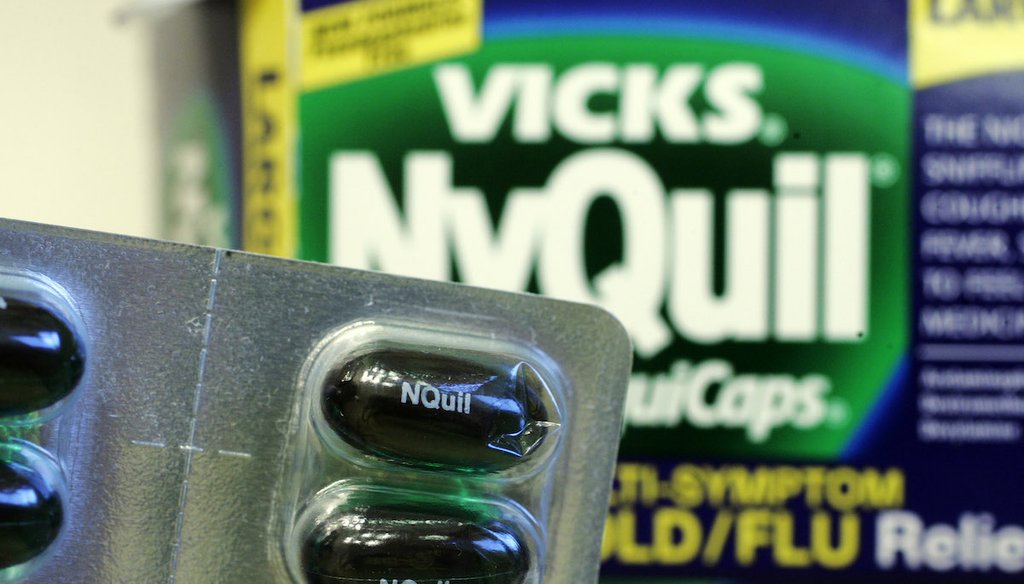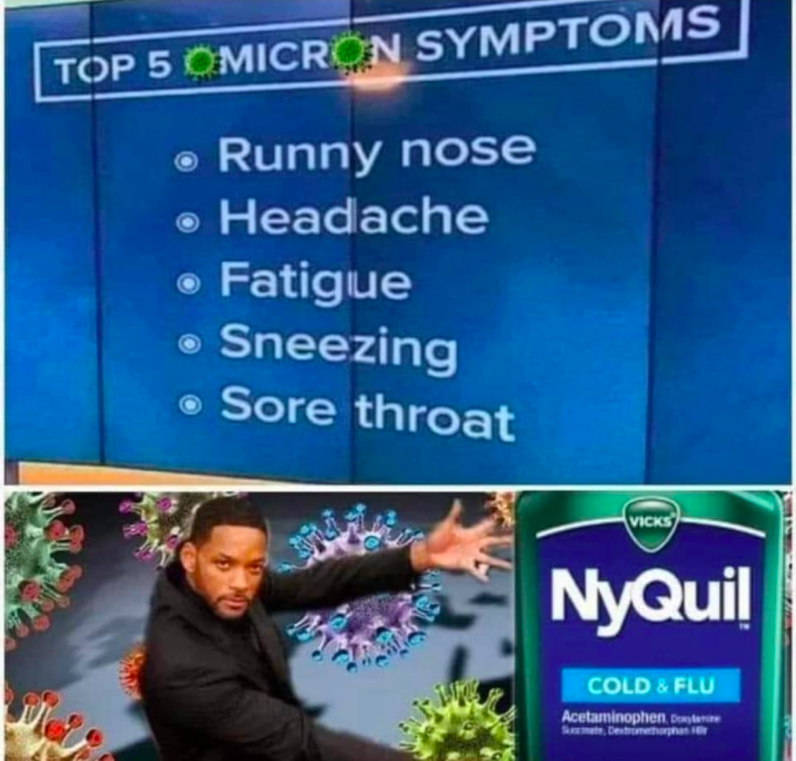Stand up for the facts!
Our only agenda is to publish the truth so you can be an informed participant in democracy.
We need your help.
I would like to contribute

NyQuil caplets are shown in a medicine cabinet at a home in Palo Alto, Calif., Tuesday, June 30, 2009. (AP)
If Your Time is short
-
NyQuil is not a replacement for vaccine protection that prevents severe infections and hospitalization.
-
Experts said NyQuil can be taken to relieve symptoms from COVID-19 or cold and flu illnesses as someone’s body fights off the illness. But there is no guarantee that all infections will be mild with symptoms that mirror the common cold.
-
While some symptoms of the cold, flu and COVID-19 overlap, there are important differences and risks to consider with a COVID-19 infection, especially for the unvaccinated.
According to a meme of actor Will Smith, the omicron variant of COVID-19 is easy to treat with common cold medicine.
Several Facebook users, including conservative politician Kimberly Klacik, shared a two-part image listing the "top five" omicron symptoms, which it says are runny nose, headache, fatigue, sneezing and sore throat. At the bottom of the picture is an image of Smith, pointing to a bottle of NyQuil, which lists those very symptoms.
"So… NyQuil was always the cure?" a commenter wrote on a similar post. "Better than the (vaccine emoji)."
These posts dismiss the omicron variant of COVID-19 as nothing more than the common cold or flu. The post was flagged as part of Facebook’s efforts to combat false news and misinformation on its News Feed. (Read more about our partnership with Facebook.)
No doubt, many people who have or have had COVID-19 had minor symptoms like the ones in the image — especially if they were vaccinated. But medical experts told PolitiFact that this claim doesn’t take into account the full picture of how COVID-19 operates, and there is no guarantee that every infection will be as mild as the common cold.
NyQuil as a treatment option
The omicron symptoms listed in the post are similar to the top five symptoms reported by COVID-positive Londoners in the ZOE COVID Study. English researchers noted that symptoms reported during the omicron outbreak matched those of the earlier delta outbreak.
Dr. Daniel B. Fagbuyi, emergency room physician and former Obama administration appointee to the National Biodefense Science Board, said that NyQuil can offer relief from symptoms that come with COVID-19 as the body’s immune system fights off the illness. But the medicine definitely isn’t a replacement for vaccines, he said.
"It’s still a coronavirus, and (omicron is) a variant of this COVID. And we don’t know the long-term consequences of these things, right? We want to avoid or at least reduce the likelihood that one could get severely sick, or be hospitalized. So vaccines will always still be the number one best choice," said Fagbuyi.
Fagbuyi said that while the omicron variant seems to be milder with cold-like symptoms than the more severe delta variant, a person can’t pick which variant they would rather have.
Symptoms of breakthrough infections in fully vaccinated people are generally milder than symptoms in unvaccinated people, and some people may not experience any symptoms, according to Johns Hopkins University.
While it may relieve some symptoms, NyQuil does not reduce contagiousness, nor shorten the course of illness. And it should be taken at the recommended dose.
"NyQuil contains acetaminophen, which at high doses is highly toxic to the liver. Furthermore, you need to be careful if you are taking more than one product," said Dr. Mary Jo Trepka, M.D., chair of the epidemiology department at Florida International University.
Dr. Joshua Sharfstein, vice dean for public health practice and community engagement at Johns Hopkins University, said NyQuil "will not be of assistance to people with more severe infections from COVID, with symptoms like pneumonia."
Older patients and people with more severe symptoms need to seek medical attention, said Sharfstein, and they may require antiviral medications, monoclonal antibodies, oxygen, and other possible therapies.
Not the common cold
There is a broader issue with the meme’s implication that omicron is no bigger deal than the common cold or flu. That belies the strain of COVID-19 on the health care system and that cases of COVID-19 are less predictable than common colds.
In addition to the top symptoms mentioned in the meme, NPR reported that omicron can also cause a myriad of other symptoms, like nausea, night sweats and lower back pain. Other symptoms of COVID-19 include loss of taste and smell, and there is a small possibility for long-term effects, called "long COVID."
The World Health Organization urged caution: Just because omicron appears to have milder symptoms than delta, an infection can still carry high risk. "While omicron does appear to be less severe compared to delta, especially in those vaccinated, it does not mean it should be categorized as mild," WHO Director-General Dr. Tedros Adhanom Ghebreyesus said Jan. 6. "Just like previous variants, omicron is hospitalizing people, and it's killing people."
The total number of COVID-19 deaths in the United States is well above 829,000. As of Jan. 5, reports from the Washington Post and the New York Times show more than 100,000 COVID-19 hospitalizations.
Hospitals around the country have reported being strained for resources, personnel and beds amid the omicron surge.
And while the hospitalization rates for COVID-19 patients have stayed about the same since the outbreak started, thousands of people with the disease continue to require care. COVID-19 patients were using 21,620 ICU beds, one-third of total beds in use, according to data from the U.S. Department for Health and Human Services.
Compared with the number of COVID-19 deaths, the CDC estimates that between Oct. 1, 2021 to Jan. 1, 2022, there were between 730-2,200 deaths from the flu.
Vaccinated people can catch breakthrough cases of COVID, and experts said that there is some risk of vaccinated people spreading it. However, unvaccinated people are the most impacted by hospitalizations and deaths.
"The big picture is understanding that this still is COVID, and the full story hasn’t been told yet. This is just another piece of the puzzle," said Fagbuyi.
Our Sources
Facebook post, Dec. 30, 2021
Archived Facebook post, Dec. 29, 2021
ZOE, What are the symptoms of Omicron? Updated Jan 7, 2022
Johns Hopkins, Breakthrough Infections: Coronavirus After Vaccination, accessed Jan. 4, 2022
Poison Control, accessed Jan. 4, 2021
Mayo Clinic, Treating COVID-19 at home: Care tips for you and others, accessed Jan. 4, 2022
NPR, What we know about the symptoms — and the severity — of the omicron variant, Jan. 6, 2022
NPR, Coronavirus FAQ: What is long COVID? And what is my risk of getting it? Nov. 18, 2021
World Health Organization, WHO press conference on coronavirus disease (COVID-19), Jan 6, 2022
Centers for Disease Control and Prevention, COVID Data Tracker, Jan. 7, 2021
The Washington Post, Tracking U.S. covid-19 cases, deaths and other metrics by state, accessed Jan. 5, 2022
The New York Times, Coronavirus in the U.S.: Latest Map and Case Count, accessed Jan. 5, 2022
Miami Herald, Cleveland Clinic Florida postpones non-urgent surgeries as COVID surges, visits limited, Jan. 6, 2022
Reuters, Fauci warns against complacency as Omicron strains U.S. hospitals, Jan. 5, 2022
FOX 8, Omicron surge, weeks away from peak, will likely get worse before it gets better, Jan. 4, 2022
U.S. Department for Health and Human Services, Hospital Utilization, accessed Jan. 7, 2022
Centers for Disease Control and Prevention, 2021-2022 U.S. Flu Season: Preliminary In-Season Burden Estimates, accessed Jan. 7, 2022
PolitiFact, Biden says that vaccinated people can’t spread COVID-19. That’s not what CDC says. Dec. 22, 2021
CDC, COVID-19 Vaccination and Non–COVID-19 Mortality Risk — Seven Integrated Health Care Organizations, United States, December 14, 2020–July 31, 2021, Oct. 29, 2021
Phone interview with Dr. Daniel Fagbuyi, emergency room physician and former Obama administration appointee to the National Biodefense Science Board, Jan. 3, 2021
Email interview with Dr. Joshua Sharfstein, vice dean for public health practice and community engagement at Johns Hopkins University, Jan. 3, 2021
Email interview with Dr. Mary Jo Trepka, chair of the Department of Epidemiology at Florida International University, Jan. 3, 2021























